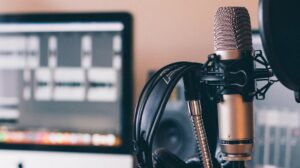
In the past decade, I’ve written several posts (like this one and this one) about why I don’t have a podcast and questioning the basic economics of the industry. Recently, I’ve spotted several articles about the business undergoing a major financial crunch. From the NY Times:
Strong growth in podcast listening and aggressive maneuvering from deep-pocketed companies helped drive the original gold rush. Since 2014, the year “Serial” debuted, the percentage of Americans 12 and over who have listened to a podcast has jumped to 62 percent from 30 percent, for a total of 177 million, according to a report released last year by the analytics firm Edison Research. In 2018, Spotify began acquiring the exclusive rights to podcasts to attract new users and diversify its business. Amazon followed suit, stocking up on original and exclusive podcasts for its services Audible and Amazon Music.
Payouts for content publishers soared. Spotify paid $230 million for Gimlet Media in 2019 and around $200 million more for The Ringer, Bill Simmons’s sports media company, in 2020. Later that year, as consumers spent even more time listening to podcasts during the pandemic, Amazon bought the popular podcast studio Wondery for $300 million, while SiriusXM paid $325 million for the platform and publisher Stitcher.
Individual podcasts with popular hosts fetched similarly lofty sums. Spotify spent more than $200 million for “The Joe Rogan Experience” in 2020 and $60 million for Alex Cooper’s “Call Her Daddy” in June 2021. That same month Amazon paid up to $80 million for “Smartless,” hosted by the actors Will Arnett, Jason Bateman and Sean Hayes, according to Bloomberg.
The problem is that those companies got very small returns (if any) on their investments because the advertising market has dried up considerably. In fact, it may not have been very robust at the time those deals were made in the first place.
That’s why Amazon, Sirius, NPR, and Spotify have made those large cuts to their podcasting budgets. Spotify may be the most glaring example. Have any of the hosts the company signed caused more people to subscribe to the service — and stay subscribed? I doubt it.
The only winners here were the hosts that got those big paydays. But they shouldn’t count on ever seeing such deals again. Neither will anyone else.
There are now more than three million podcasts available for download, but only a very small minority are money-makers. If we guess that 300 shows have enough advertising income to earn even $25,000/year, that’s 0.1% of all those three million. If you were a one-person operation, that might be acceptable as a hobby, but not nearly enough to quit your day job. Many of these productions have entire teams. How can they survive when 99.9% are losing money? No company can endure that simple arithmetic.
Nine years ago, I wrote on this topic:
I listen to several podcasts regularly, but I don’t pay a dime to support them. Like radio itself, I’m willing to put up with the advertising messages necessary to keep those podcasts available for free — but once they go to a pay model, I’d more than likely stop downloading them. I know several people in the radio business who, after losing their on-air jobs, tried to go the paid podcast route, but it didn’t last long.
As for the advertising in podcasts I’ve heard, much of it is made up of per-inquiry commercials, in which the host gives you a special discount code to type in on a website when you order a service, akin to “Tell them I sent you for 5% off!” That’s not some special deal the host worked out for you. It’s a metric an advertiser uses to see how many listeners are converted to purchasers (i.e. does the commercial work?). It’s the audio equivalent of click-and-buy-rates on website banner ads. Those per-inquiry commercials always sound cheap and cheesy to me, about as classy as the banner ads that expand when you don’t want them to, or automatically start up some video and audio every time you open the page. In other words, more annoying than effective.
Some people who do podcasts are in it for brand extension. For example, they’re already paid to write for a news outlet (e.g. Slate, NPR, ESPN), and get to do podcasts or videos, as well, probably for no extra pay. With the company name and distribution platform already set up, they podcast away and develop an audience. But would they survive without that platform? Unlikely.
